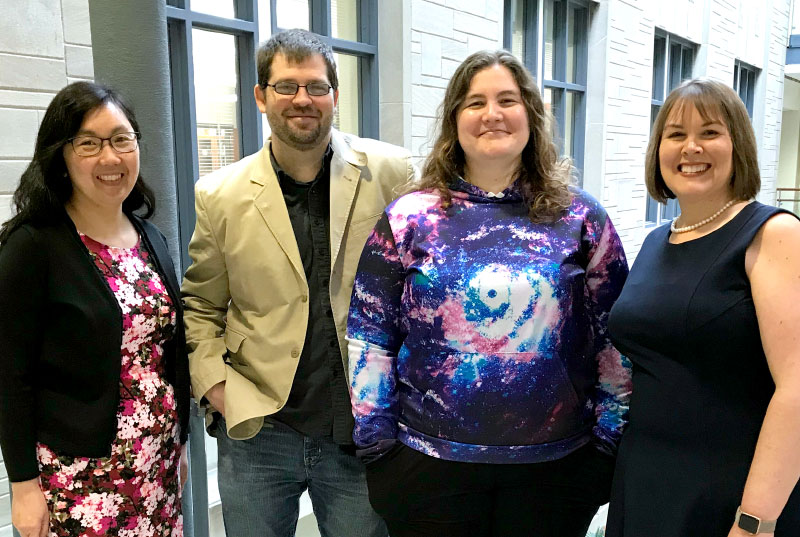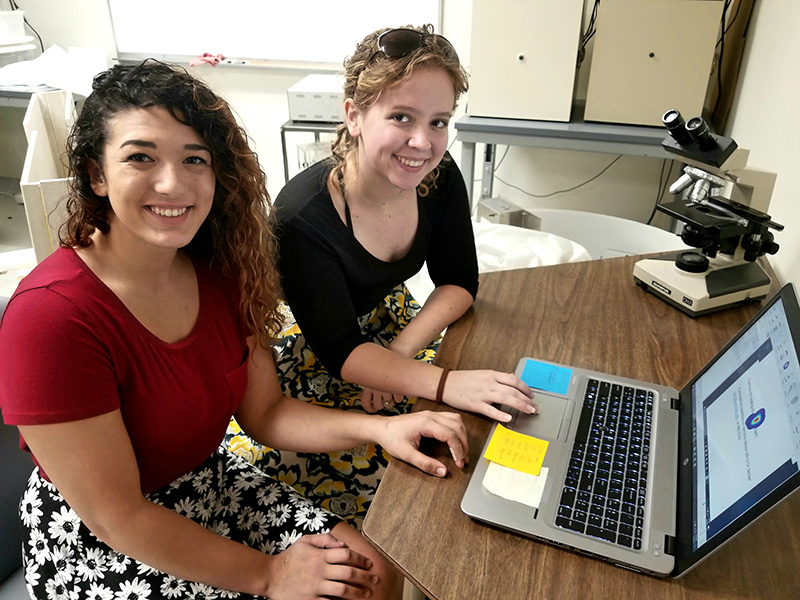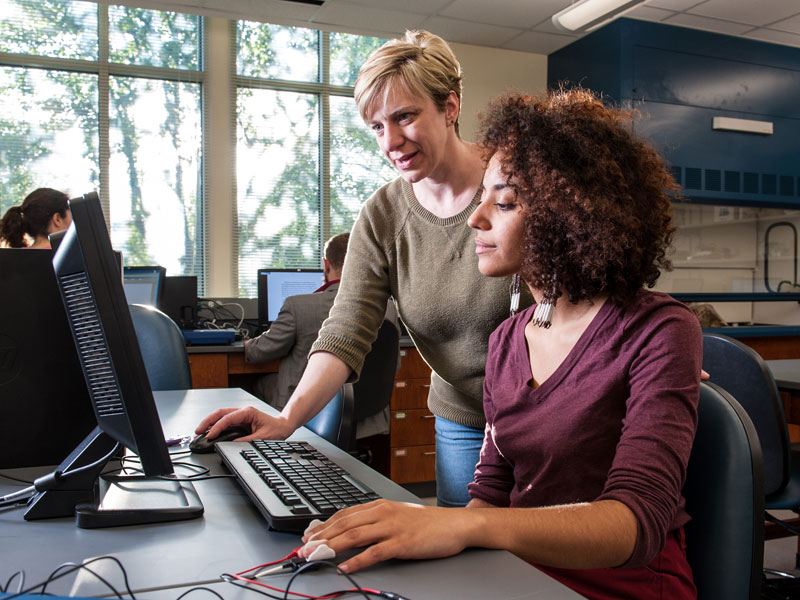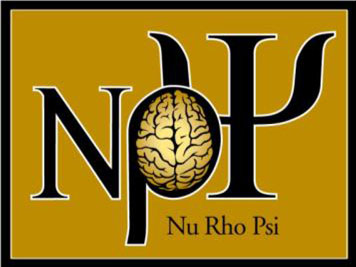News
UE CiSM Project Receives $1 Million Grant for Scholarships from the NSF S-STEM Program
Posted: February 11, 2019
The University of Evansville’s Computers in Science and Math (CiSM) project has been awarded a grant totaling $999,934 to fund scholarships for academically talented students with financial need majoring in biochemistry, biology, chemistry, environmental science, mathematics, physics, or statistics and data science.
The project, funded by the National Science Foundation’s (NSF) Scholarships in Science, Technology, Engineering, and Mathematics (S-STEM) program, is led by UE faculty members Joyce Stamm, professor of biology; Angela Reisetter, associate professor of physics; Adam Salminen, associate professor of mathematics; and Sarah Wilson, assistant professor of chemistry.
The CiSM scholarships will be available beginning in the fall 2020 semester and will provide up to $10,000 per year for four years to two cohorts of seven or eight students. These students will be part of an interdisciplinary learning community established through an all-expenses paid bridge course during the summer before the freshman year, and maintained as the students live together in UE’s honors residence hall and enroll together in computational problem-solving courses. CiSM students will also receive summer research and conference attendance funds, and CiSM-specific academic advising, career preparation, and mentoring.
“This interdisciplinary cohort approach will prepare our students for a real work setting, where biologists and mathematicians may work alongside chemists and physicists toward a common goal,” said Stamm. “The interpersonal skills developed from living and working together are just as, if not more, important than the technical skills gained through coursework. It allows them to learn to speak the same language.”
Reisetter added, “Computational problem-solving skills are not currently emphasized in UE’s math and science curriculum, so we’re particularly excited to develop additional talents in our students, which will translate into broader career opportunities and workplace success upon graduation.”
To develop these skills, the project will introduce a scaffolded curriculum with four interdisciplinary computational problem-solving courses. The first three courses will focus on the power of computational and data visualization skills in the sciences, and introduce students to interesting data-centric scientific projects. The fourth course will be part of the UE ChangeLab program and will pair student and faculty teams with local business or nonprofit clients. Students will work with the clients to solve a problem involving experimental design, data collection, and/or data analysis. Because these courses will be open to all math and science majors at UE, the CiSM project will have impact beyond the scholarship recipients.
“The digital revolution has allowed scientists and businesses to collect vast quantities of data,” said Salminen. “Marketing firms, educators, and sports teams have gleaned knowledge and insights from this data for application to business techniques for many years. Of particular importance here is the growing need of these skills in the sciences.”
Data scientists and statisticians work to develop new statistical approaches and develop new software and techniques of analysis. However, scientist in other areas such as genomics, particle physics, and neuroscience need to use these techniques to unravel the massive amounts of data that they collect. Moving forward, scientists will need to have a better understanding of working with large data, and statisticians and mathematicians, with proper training and interest, can help tackle difficult problems throughout the sciences.
In line with the NSF’s mission to improve STEM undergraduate education, another important goal of the project is to determine the impacts of the learning community on CiSM scholars.
“We will assess each of the project’s activities using a mixed-methods approach, to examine how involvement in the CiSM community affects students’ science and mathematics self-efficacy, sense of community, retention, success, and progression to STEM careers,” said Wilson. “We hope that the CiSM project will serve as a model for interdisciplinary STEM education at institutions similar to UE.”
Clare Mathes to Speak at UE’s Crick Lecture in September
Posted: September 11, 2018
Clare Mathes, associate professor of psychology and neuroscience at Baldwin Wallace University, will be the guest speaker for the University of Evansville’s annual Fall Crick Lecture in the Cognitive and Neural Sciences. The lecture is set for September 20 at 4:00 p.m. in Room 100 (Vectren Lecture Hall) in the Koch Center for Engineering and Science. This event is free and open to the public.
Mathes will be discussing a rat model of Roux-en-Y gastric bypass surgery and its influence on taste-guided behavior.
A behavioral pharmacologist, Mathes’s research focuses on the neurochemistry involved in detecting and enjoying the taste of foods and beverages and how behaviors guided by taste impact eating and body weight status. She uses animal models – primarily rats – to assess these behaviors. Her area of expertise centers around behavior analysis.
Mathes earned her PhD in psychobiology from the University of Florida, and held a postdoctoral fellowship at Florida State University.
Students to present at Society of Neuroscience meeting
Posted: August 7, 2017
University of Evansville neuroscience students Sarah Dufresne and Brianna Nichols have been selected to present at the Society for Neuroscience meeting in Washington, DC, this November.
The two will be presenting the results of their study comparing neuromarketing methodologies.
Dufresne, the lead on the project, was awarded a travel grant by the Faculty for Undergraduate Research. The national competition for grant is very challenging. There are over 200 applicants for 25 grants, and in order to be accepted, students need to show excellence in both quality of science and devotion to their project.
Equipment for the study was purchased with funds from a UE Innovation and Reinvestment grant and a Ball Brothers Venture grant.
As part of their study, Dufresne and Nichols used an eye tracker that reads pupil diameter and a devise that reads galvanic skin response (electrical changes in skin conductance) caused by the sympathetic nervous system responding to alarming or alerting stimuli. The students compared responses to the same stimuli and ran a mathematical analysis that allows them to graph one physiological measure against the other.
“This analysis allows researchers to compare results across the measurement technique,” explained Lora Becker, UE neuroscience program director and associate professor of psychology. “Our results are like a comparison of GRE to MCAT scores.”
UE Professor Lora Becker Receives University’s Eykamp Prize at Commencement
Posted: May 6, 2017
University of Evansville associate professor of psychology and director of the neuroscience program Lora Becker was named the recipient of the 2017 Eykamp Prize during the University’s 159th Commencement exercises. Becker is the second recipient of the honor.
The award was established through the generosity the Eykamp family as a way to recognize extraordinary contributions made by UE faculty to the University.
Becker came to the University of Evansville nearly 18 years ago from the State University of New York-Binghamton where she earned a Master of Arts degree in psychology-psychobiology and a PhD in psychology-behavioral neuroscience. She earned a Bachelor of Science dual degree in biology and psychology from Wright State University.
At UE, she has been named a Global Scholar, and she is passionately involved in the GAP Program that focuses on neuromarketing. Becker directed the summer reading program for several years as well as the major discovery program for undeclared students. She is known for reaching across campus to all departments, schools, and colleges to develop curriculum and undergraduate research opportunities.
On presenting Becker with the award, Rita Eykamp noted that Becker “exemplifies the goals of this award and has displayed extraordinary service to UE. She mentors students while taking a genuine personal interest in their success; and she is known for supporting the mission of the University through participation on campus committees and attending campus events.”
Austin delivers final Crick Lecture of the year
Posted: April 10, 2017
University of Evansville executive vice president for academic affairs Michael Austin will deliver the University’s final Crick Lecture of the 2016-17 school year. His topic will be “A Certain Convocation of Politic Worms: Literature and the Fear of Being Eaten.” The lecture will be April 12 at 4:00 p.m., in Room 100 in the Koch Center for Engineering and Science.
All Crick Lectures are free and open to the public and aimed at a general audience. The series is jointly sponsored by the Cognitive Science and Neuroscience programs.
In this presentation, Austin will draw on his book Useful Fictions: Evolution, Anxiety, and the Origins of Literature to try to answer the question "why does a species whose survival depends on the ability to collect and use accurate information have a universal predilection for fictional narratives?"
The answer takes us far back into humanity’s evolutionary past and deep into a cognitive structure that evolved to help organisms compete for resources in an environment full of dangerous predators and perilous situations.
UE alumnus publishes undergraduate teaching article
Posted: November 16, 2016
Alexander J. Bies ’09, has published an undergraduate teaching article in the Journal of Undergraduate Neuroscience Education. The title of his article is “Cockroaches Now Evading Death by Getting Bitter about Sweeteners.”
Bies graduated from UE in 2009 with a degree in neuroscience. He is currently at graduate student in the Department of Psychology at the University of Oregon.
The Journal of Undergraduate Neuroscience Education is an online journal for undergraduate neuroscience faculty.
Becker publishes article in Journal of Undergraduate Neuroscience Education
Posted: August 26, 2016
Lora Becker, associate professor of psychology and director of neuroscience and the neuromarketing research center, has had an article published in the Journal of Undergraduate Neuroscience Education. The article is a summary of what has been accomplished in the honors society for neuroscience. To read the article, go here
Yazdanparast and Becker present at conference
Posted: August 23, 2016
Atefeh Yazdanparast, assistant professor of marketing, and Lora Becker, associate professor of psychology and neuroscience director, presented their global scholar study at the 2016 Global Marketing Conference at Hong Kong on July 21-24.
Their paper Emotions and cosmetic surgery motivations across cultures: A Neuromarketing investigation was presented in the Neuromarketing Science and Business Association/Global Research and Business Social Platform for Marketing and Management.
The conference boasted a representation of 51 countries.
UE student and alum have article published in Life Sciences
Posted: August 19, 2016
An article by UE student Choudhury (Spike) Yusuf, a biology and neuroscience major with a minor in ethics, and David Pollock '78 has been published in Life Sciences. The article is titled Ovarian hormones modulate endothelin A and B receptor expression
This work was done during Yusuf's 2015 summer research experience in Pollock's lab. Pollock is a professor in the Division of Nephrology in the Department of Medicine, University of Alabama at Birmingham.
Pollock, who earned a Bachelor’ of Science in biology at UE, is a world-renowned scientist whose research program addresses questions related to mechanisms of endothelin control of renal hemodynamics and excretory function.
Yazdanparast and Becker present global scholar study
Posted: August 19, 2016
Atefeh Yazdanparast, assistant professor of marketing, and Lora Becker, associate professor of psychology and neuroscience director, presented their global scholar study at the 2016 Global Marketing Conference at Hong Kong on July 21-24.
Their paper Emotions and cosmetic surgery motivations across cultures: A Neuromarketing investigation was presented in the Neuromarketing Science and Business Association/Global Research and Business Social Platform for Marketing and Management.
The conference boasted a representation of 51 countries.
Lora Becker Has Two Articles Currently in Print
Posted: June 6, 2016
Lora Becker, University of Evansville associate professor of psychology and director of the neuroscience program, has two appearances currently in print in very different sources.
The first is titled “Neurobehavioral toxicity of carbon nanotubes in mice: Focus on brain-derived neurotrophic factor messenger RNA and protein” and is co-authored by Babak Gholamine, Isaac Karimi, Amir Salimi, Parisa Mazdaran, and Becker. It appeared in Toxicology and Industrial Health on May 26. This is part of her ongoing collaboration with Isaac Karimi in Iran.
The second is an article titled "Why so Angry? The new faces of gender politics" that will appear in the June newsstand version of the national fashion magazine Allure. In this article, Becker explains how micro-expressions are expressed by the nervous system and how they can be used to understand reactionary human feelings. This is a result of a collaboration with Noldus.
Associate Professor of Psychology Lora Becker Earns Volunteer Recognition
Posted: October 7, 2015
Lora Becker, associate professor of psychology at the University of Evansville, has earned the October 2015 Volunteer Spotlight by the Honor Society of Phi Kappa Phi. Becker is currently serving as president of the University of Evansville chapter of Phi Kappa Phi.
Phi Kappa Phi's mission is "To recognize and promote academic excellence in all fields of higher education and to engage the community of scholars in service to others."
For more information, go to: http://www.phikappaphi.org/about/news/2015/09/21/volunteer-spotlight-october-2015#.VhUinPlVhBc
UE Receives Ball Brothers Foundation Venture Fund Grant for New Neuromarketing Center
Posted: June 17, 2015
The University of Evansville has been awarded a Ball Brothers Foundation Venture Fund Grant of $22,000 for its newly instituted Neuromarketing Research Center. Through the Neuromarketing Research Center, interdisciplinary student teams serve clients by testing responses to various marketing elements and tactics using leading-edge neuroscience techniques.
“The Neuromarketing Research Center is a great example of the interdisciplinary training that occurs at the University of Evansville,” says UE associate professor of psychology Lora Becker.
UE assistant professor of marketing Atefeh Yazdanparast explains that neuromarketing is a relatively new research discipline that combines neuroscience with marketing.
“This emerging field goes beyond traditional tools of research and focuses on consumers’ reactions to marketing stimuli. We are proud to equip our students with neuromarketing research techniques, a valuable competitive edge in today’s dynamic and highly competitive market.”
The Neuromarketing Center is a part of the University’s successful GAP program.
“In this program,” explains Jill Griffin, executive director of the Institute for Global Enterprise, “undergraduates of all majors obtain real-world experience and build professional confidence while producing real results for actual companies.”
UE vice president of marketing Don Jones adds that “students and their business clients will both benefit from the unique insights delivered through this innovative approach. The Neuromarketing Research Center will facilitate the convergence of the latest ideas from neuroscience applied to the most challenging opportunities for business.”
The program will also offer opportunities for UE faculty and students to engage in neuromarketing research on a global level. Yazdanparast and Becker will kick off this global research with initial work in Australia and China this year.
The Ball Venture Fund was created in 1999 to enable the Ball Brothers Foundation to take an active role in encouraging and supporting creative efforts at Indiana’s independent colleges and universities. The program, administered by the Independent Colleges of Indiana (ICI), provides seed money for innovative start-up programs at ICI member institutions.
The GAP Program is supported by a grant from Lilly Endowment Inc.
University of Evansville Alumna to be Speaker at UE Crick Lecture
Posted: October 28, 2014
Emily Durbin, associate professor of psychology at Michigan State University and University of Evansville graduate, will return to UE as guest speaker for the November Crick Lecture in Cognitive and Neural Science. The event will be Wednesday, November 12, from 4:00-5:00 p.m., Room 100, Koch Center for Engineering and Science. This event is free and open to the public.
The topic of Durbin’s lecture will be her research into the emotional life of children, which she studies in her lab at Michigan State (MSU Child Emotions Lab). Areas studied include temperamental differences in emotional experience and how these are related to the family environment and parents' personality and emotions.
Durbin earned her bachelor’s degree from UE and her master’s and PhD from State University of New York at Stony Brook.
Neuroscience Honor Society Chapter Coming to the University of Evansville
Posted: December 6, 2012
The University of Evansville has received the 29th charter for Nu Rho Psi, the national honor society in neuroscience. An induction ceremony for the Indiana Alpha chapter is scheduled for January 2013.
Undergraduate students who want to apply for Nu Rho Psi must have completed at least three semesters of the college curriculum and nine semester hours in neuroscience major courses, be registered as a neuroscience major, and have an overall cumulative GPA of 3.2 and a minimum GPA of 3.5 in neuroscience courses.
For questions or to apply, contact Dr. Lora Becker at 812-488-2532, lb47@evansville.edu or stop by her office in Hyde Hall 205.
Nu Rho Psi was founded in 2006 by the Faculty for Undergraduate Neuroscience. The honor society’s purpose is to:
- encourage professional interest and excellence in scholarship, particularly in neuroscience;
- award recognition to students who have achieved such excellence in scholarship;
- advance the discipline of neuroscience; encourage intellectual and social interaction between students, faculty, and professionals in neuroscience and related fields;
- promote career development in neuroscience and related fields;
- increase public awareness of neuroscience and its benefits for the individual and society; and
- encourage service to the community.




